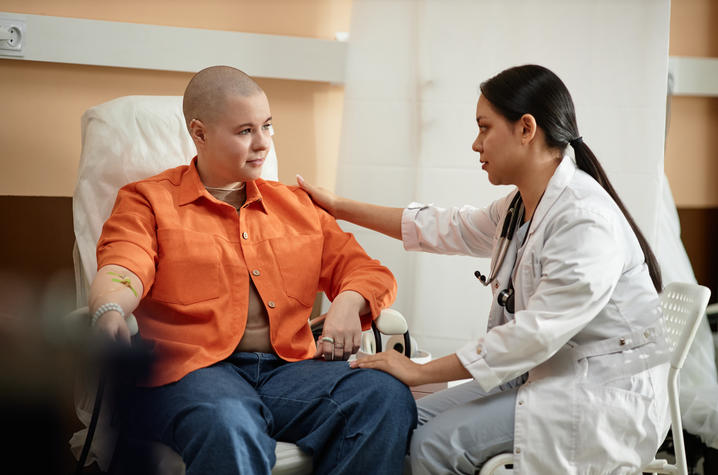Considering clinical trials for cancer care

The University of Kentucky Public Relations and Strategic Communications Office provides a weekly health column available for use and reprint by news media. This week’s column is by Susanne Arnold, M.D., a medical oncologist and co-leader of translational oncology at the UK Markey Cancer Center.
LEXINGTON, Ky. (Nov. 3, 2025) — If you or a loved one is facing a cancer diagnosis, you may want to consider discussing clinical trial options with your oncologist or health care team. For many people who have cancer, clinical trials can offer hope and access to innovative treatments that may offer better outcomes than current standard therapies.
Clinical trials drive progress in cancer care and are vital to developing new treatments. In fact, every standard-of-care treatment that we give to patients today started as a clinical trial. By participating in a clinical trial, patients also have a chance to contribute to scientific progress and help others fighting cancer in the future.
Types of clinical trials
Clinical trials are structured research studies that test new ways to find, prevent and treat cancer. They also help doctors improve the quality of life for people with cancer by testing ways to manage the side effects of cancer and its treatment.
Many cancer clinical trials are treatment studies that involve people who have cancer. These trials test treatments including new drugs, vaccines, approaches to surgery or radiation therapy or new ways of using existing treatments more effectively.
There are also prevention and screening studies that look at ways to prevent cancer or find it before it causes symptoms, when it may be easier to treat.
All clinical trials have added layers of protection through federal and state regulations and institutional review boards whose goal is to protect research participants welfare, rights and privacy.
When to consider a clinical trial
Clinical trials may not be suitable for everyone with cancer. It depends on many factors including a patient’s specific cancer type, treatment goals and the need for salvage therapies if initial treatments fail. Often, your oncologist will suggest clinical trials during the continuum of cancer care.
For example, a clinical trial could provide an alternative if standard treatments have not been effective or are no longer an option. For patients with early-stage cancer, there are trials available that are aimed at preventing recurrence or improving outcomes. Trials for advanced cancer often focus on improving quality of life and extending survival.
Clinical trials in Kentucky
The University of Kentucky Markey Cancer Center has more open clinical trials than any other cancer center in the region, giving patients access to some of the most advanced options available.
Markey is also the only National Cancer Institute-designated Comprehensive Cancer Center in Kentucky. To become NCI designated requires a rigorous evaluation to assure the NCI of the high quality of the care and research ongoing at the center. NCI designation means that Markey patients can take advantage of new treatments, drugs or technologies that are not readily available elsewhere. This includes access to clinical trials only available at NCI-designated cancer centers.
Through its Research Network, Markey offers patients access to these clinical trials in multiple locations in Kentucky, so they can participate in the latest trials closer to home.
Markey’s Precision Medicine Clinic also conducts cutting-edge trials that aren’t available anywhere else in Kentucky and in few centers across the country. Access to these new treatments at the forefront of cancer research can offer hope to patients who have exhausted all other treatment options.
Finding a trial that meets your treatment goals
Start by discussing clinical trial options with your oncologist. They can guide you based on your diagnosis and treatment history. Patients at Markey or with referring physicians can also contact Markey research nurse navigators directly at 859-323-7628 to learn more.
A full list of trials supported by the National Cancer Institute can also be found here.
UK HealthCare is the hospitals and clinics of the University of Kentucky. But it is so much more. It is more than 10,000 dedicated health care professionals committed to providing advanced subspecialty care for the most critically injured and ill patients from the Commonwealth and beyond. It also is the home of the state’s only National Cancer Institute (NCI)-designated Comprehensive Cancer Center, a Level IV Neonatal Intensive Care Unit that cares for the tiniest and sickest newborns and the region’s only Level 1 trauma center.
As an academic research institution, we are continuously pursuing the next generation of cures, treatments, protocols and policies. Our discoveries have the potential to change what’s medically possible within our lifetimes. Our educators and thought leaders are transforming the health care landscape as our six health professions colleges teach the next generation of doctors, nurses, pharmacists and other health care professionals, spreading the highest standards of care. UK HealthCare is the power of advanced medicine committed to creating a healthier Kentucky, now and for generations to come.




